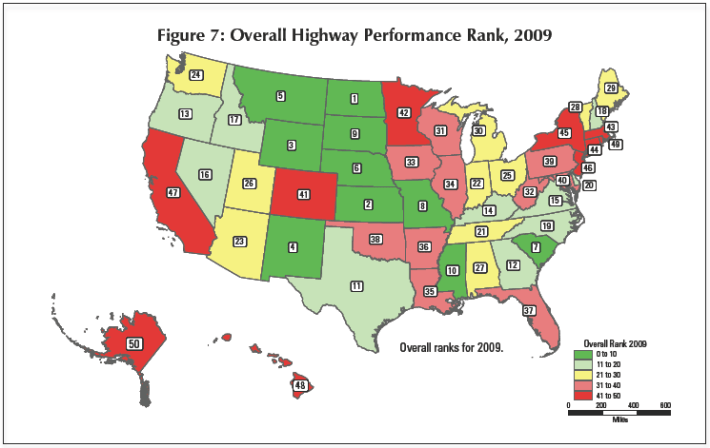Just what does good state highway performance look like, according to the climate change skeptics at the Reason Foundation? This "libertarian think tank" -- funded by Exxon Mobil and the Koch Family Foundations, among others -- has a funny way of judging these things. But media outlets all over the United States are reporting its findings as if they're gospel.

According to Reason's 20th annual analysis of state highways, largely rural states like North Dakota, Kansas, and Wyoming are performing best, while more urbanized states like New York, Massachusetts, and California are in the bottom tier.
What goes into these rankings? We set out to see if the whole thing was worth taking seriously.
Reason took 11 indicators into account when judging states' performance. A few are reasonable enough: percentage of deficient bridges, road conditions in rural and urban areas, how much states spend on administration versus construction.
But there are quite a few head scratchers. States are rated by how much they are spending per mile on capital and bridge disbursements. Here rural, southern, lower-cost regions perform better: South Carolina and West Virginia spend the least per mile, receiving the highest rankings. Places with higher costs of living score badly. The "worst performers" in this category are New Jersey, Florida, and California.
States are also rated on how much they spend on road and bridge maintenance per mile. North Dakota and South Dakota are awarded the highest rankings for devoting about $5,000 per mile to maintenance in 2009. States that spent the most money on maintenance per mile, New Jersey and California -- about $185,000 and $150,000 respectively -- came in last.
Phineas Baxandall at the Pubic Interest Research Group said Reason's method of measuring efficiency is sorely lacking. "Purely a dollar per mile is going to be kind of a biased opinion," he said. "The more urban you are, the harder it is to just pour tarmac and open roads, the more expensive it is." Additionally, things like environmental remediation or overpasses that make it possible for pedestrians and cyclists to traverse urban highways would end up making the agency that funded them look "inefficient."
A more fundamental problem is that Reason's report ignores non-motorized transportation, added Todd Litman of the Victoria Transport Policy Institute. For example, say your state transportation department added a transit-only lane on an urban highway that many people use to commute to work. The road would carry more people, but since the report only measures congestion on highways, and not the more important concept of "accessibility," your state would still be penalized, Litman said.
With that, here's our two-part verdict:
One, states that are doing a decent job of managing their transportation systems might actually be rated very poorly by this report.
Two, media outlets should be much more skeptical about transportation reports from groups that deny climate science.





